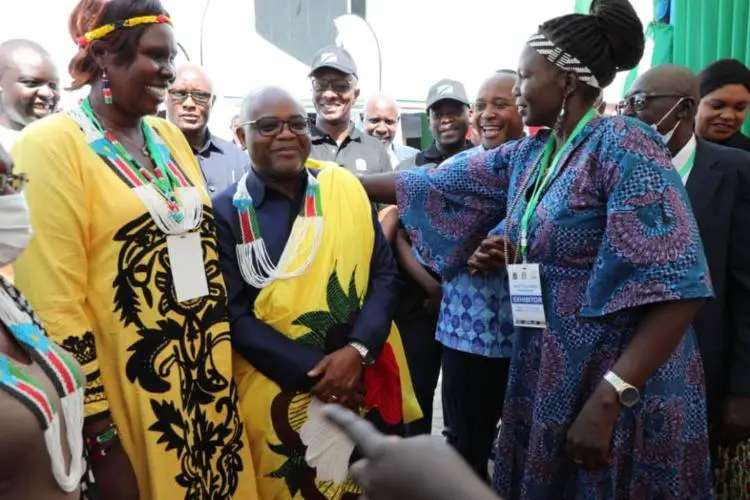- MSMEs account for 90 per cent of businesses and 80 per cent of employment in East Africa.
- EAC Partner States still have a critical role in enabling MSMEs growth to ensure long term sustainability and recovery.
- Partner States should encourage research and development as requisites for innovation and growth.
The EAC Secretary General Dr. Peter Mathuki says that Micro, Small and Medium Enterprises (MSMEs) play a crucial role in the economic development of East African countries.
MSMEs account for 90 per cent of businesses and 80 per cent of employment, especially among youth and women.
Speaking during the official opening of the 21st MSMEs Trade Fair at Rock City Grounds, Mwanza, United Republic of Tanzania, Dr. Mathuki reiterated that EAC Partner States still have a critical role in enabling MSMEs growth to ensure long term sustainability and recovery by promoting programmes that prioritise MSMEs to spur demand for quality finished goods and progressively improve the region’s competitiveness.
Read: Kenya: Women own half the 1.3 million MSMEs
“As the Community, we have the responsibility of enabling MSMEs growth to ensure long term sustainability and recovery,” said Dr. Mathuki.
The EAC Official informed the Exhibitors that the theme for this year recognises the impact of the Covid-19 pandemic on trade and places greater emphasises on quality and innovation as critical paths to enhance competitiveness.
Dr. Mathuki commended the efforts of MSMEs for their resilience in adopting new business models to enable business continuity during the Covid-19 pandemic.
He called for the Partner States to equally encourage research and development as requisites for innovation and growth.
Dr. Mathuki cited Malaysia’s national commercialisation platform, PlaTCOM Ventures, as an example, which helps entrepreneurs turn their ideas into successful products and services. The development of micro-industrial parks with shared equipment and resources could incubate the next generation of manufacturers, added the Secretary-General.
The Secretary-General challenged the Partner States to provide all necessary support to ensure MSMEs are export-ready and ready to compete with more prominent players and offer alternatives to imported goods.
Dr. Mathuki informed the exhibitors that Banks and Financial Institutions have already driven a significant number of initiatives in East Africa to support MSMEs, including the suspension of loan repayments, fee waivers, relief loans, and expedited loan approvals in an effort to support post-Covid-19 economic recovery in the sector.
“I am confident that through collective and collaborative Covid-19 economic recovery efforts at national and regional levels, we will be able to bounce back to pre-pandemic levels of MSMEs business output,” said Dr. Mathuki.
The guest of honour, Tanzanian Minister of Industry and Trade, Prof. Kitila Mkumbo said that the main objective of the EAC MSMEs Trade Fair was to provide a platform for enhancing marketing linkages for MSMEs sector products and services within the region so as to enable them to access the existing regional market with a population of over 100 million people.
Read: How East African businesses are going to lead the AFCTA
Prof. Mkumbo disclosed that the EAC Partner States have agreed to address the challenges impacting the growth and development of MSMEs and industries in the region by developing Policies that will facilitate cross-border business in the region.
The Minister further noted that some Partner States were now establishing mechanisms to facilitate access to affordable capital by MSMEs from financial institutions.
Under the theme “Promoting Quality and Innovation to enhance EAC MSMEs Competitiveness and post Covid-19 Recovery”, the 21st edition of the annual EAC MSMEs attracted over 1,500 artisans from the six EAC Partner States, namely the Republics of Burundi, Kenya, Rwanda, South Sudan, Uganda and the host country the United Republic of Tanzania.
The first EAC MSMEs Trade Fair was held in Arusha, Tanzania in November 1999 during the historic event of the signing of the Treaty for the Establishment of the East African Community. Subsequent to the success of the Arusha exhibition, the EAC Heads of State directed that the Exhibition be held annually on a rotational basis among the Partner States so as to enhance and revamp the socio-economic integration of the people of East Africa.
Read: How Kenyan manufacturers will grow sector by 2022
